
“We know not through our intellect but through our experience.”
―
Maurice Merleau-Ponty
Dall’ Alba’s paper on improving teaching by enhancing ways of being is fascinating to me as someone who studied Existential philosophy and psychotherapy, which is fundamentally the study of phenomenology (Merleau-Ponty, M, 1962), namely, the study of ‘what is’, as she is advocating that good teaching is not solely about doing, but more importantly about ‘being’.
The aim of her paper is to contextualise the theory she teaches on her course for aiding experienced university teachers to transform and enhance their teaching by focusing less on epistemology and more on oncology. In her course she achieves this by integrating knowing, acting and being.
In the paper she outlines her approach to the course that she has been teaching at the University of Queensland for the past ten years. Some teachers come to the course to improve their teaching with the hope of promotion for example, whilst other teachers have been advised to seek further training if their teaching is not up to par.
She teaches on epistemology (the theory of knowing), and also on oncology (the theory of being). The course integrates and improves what is known about university teaching and it does so by challenging and changing the ways of being university teachers. “So, epistemology is not seen as an end in itself, but is in the service of ontology” (Dall’Alba, G, 2005).
She argues that knowledge and skills are not sufficient when transitioning, from say a medical student to a doctor, or a law student to working in chambers, but it is about the application of the knowledge and skill and how this is done comes down to being. “Knowledge and skills acquisition does not ensure skillful practice. This is not to deny the importance of knowledge and skills but, rather, to argue that their acquisition is insufficient for enacting skillful practice and for transformation of the self that achieving such practice inevitably involves. By focusing on epistemology, we fail to facilitate and support this transformation.”
She goes on to say that knowledge has to be embodied in a sense as knowledge is not solely cognitive, but it is also embodied, acted and created. “This means that knowing is not simply something we possess, but who we are.” (Dall’Alba, G, 2005). And it is so that our ‘being-in-the-world is constructed by the knowledge of which we inhabit and embody (Dreyfus, H, L, 1991)
In the course she doesn’t teach the participants ‘how to be’, but instead the participants enact the knowledge they receive throughout the course through a variety of exercises both individually and in groups, and in the process, she argues, they are transformed into better university teachers. An example of how this is achieved is by the participants analysing assessment in one of their own courses by using the research literature and they think about the strong message that the assessment relays to the students. “This process creates heightened awareness of consequences of assessment practices, which participants then incorporate into their courses in various ways. Their heightened awareness means changes they make relate not only to how they assess students, but also contribute to transforming their embodied understanding of being university teachers.” (Dall’Alba, G, 2005).
There is a vulnerability when implementing these new learned ways of being in teaching. “When transforming teaching is experienced as potentially undermining the self or familiar ways of teaching, it can elicit resistance or defensiveness. As Glenn Gray 370 G. Dall’Alba notes, with reference to Heidegger’s work: ‘There is always a struggle to advance a new way of seeing things because customary ways and preconceptions about it stand in the way’” (Dall’Alba, G, 2005).
A way to address this potential feeling of resistance and defensiveness is to adopt an attitude of openness and to stay with anxiety which may arise – this is how transformation occurs.
I really enjoyed Dall’ Alba’s paper as it brought home to me the importance of putting oneself into the relaying of knowledge, and to do so with an attitude of openness as this then gives ‘permission’ for students to do the same.
Bibliography
1), Dall’Alba, G. (2005). ‘Improving teaching: Enhancing ways of being university teachers’, in Higher
Education Research & Development, 24 (4), pp.361–372.
2), Dreyfus, H, L. (1991) Being in the world: Commentary on Heidegger’s “Being and Time”. London: The MIT Press.
3), Merleau-Ponty, M, (1962) Phenomenology of Perception. France: Routledge & Kegan Paul
